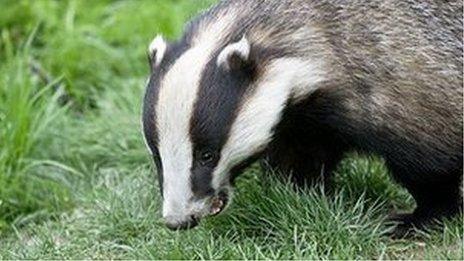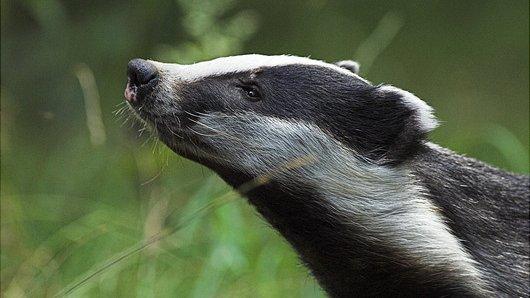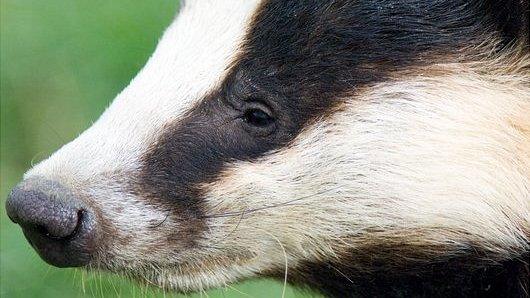No badger cull expansion after trial failure
- Published

Some badgers can carry TB and pass it on to cattle
The government has said it will not expand badger culling to other areas this year to reduce TB in cattle.
The environment department's original plan was to announce up to 10 new cull areas in south-west England each year.
Defra's own independent assessment, external shows that culls in two pilot areas were not effective, and raised questions about their humaneness.
These pilot culls will continue, though there will be no independent oversight to assess their future performance.
In a Commons statement, the Environment Secretary Owen Paterson proposed a programme of vaccination around the edges of the most badly affected parts of the country.
This, he said, would create a buffer zone of immunity that would stop the disease from spreading.
"We have always been clear that there would be lessons to be learnt from the first year of these four-year culls," Mr Paterson said.
"If we do not control TB, the bill will rise to £1bn over the next decade. It is vital that farmers, vets, non-government organisations and politicians work together to free England of TB."
'Open season'
The Shadow Environment Secretary Maria Eagle called the pilot culls "disastrous" and said Mr Paterson had put "prejudice before science".
She also said the environment secretary had ignored calls in the House of Commons to seek alternatives to culling.
"What he's announced now is simply open season on the badgers in the culling areas," she said.
Prof Rosie Woodroffe, from the Institute of Zoology, told BBC News: "I think it's excellent news that Defra ministers have decided not to extend badger culling to new areas, when the poor performance of last year's pilot culls raises very serious questions about whether this approach will make a bad situation worse.
"Continued culling in the Somerset and Gloucestershire area needs to be much more humane, and much more effective, than last year's pilots, and so I'm disappointed that this year's culls will lack the independent oversight needed to provide confidence in those key measures."
Meurig Raymond, president of the National Farmers' Union (NFU), said: "As today's strategy sets out, it is hugely important that any cattle controls go hand in hand with measures to tackle the disease in badgers. And culling must play a part in that where TB is rife."
Mark Jones, executive director of Humane Society International UK, commented: "Whilst the abandonment of the planned badger cull roll out this year is a welcome U-turn as well as a damning indictment on Defra's failed culling policy, it is nonetheless utterly indefensible that the government is carrying on regardless with its discredited cull in Gloucestershire and Somerset."
Lord Krebs: "The pilot culls were shown to be a failure"
The British Veterinary Association said it was "regrettable" the Environment Secretary had decided to announce a preferred way forward without consultation with "key stakeholders", including the BVA.
Responding to accusations he had ignored scientific advice, Mr Paterson said England's chief vet, Nigel Gibbens, had warned against stopping the cull now in the Somerset and Gloucestershire pilot areas.
He added that some £24.6m would be invested over the course of this parliament in the development of effective TB vaccines for both cattle and badgers.
"In 2013, I agreed with the European Commissioner the work needed to develop a viable cattle vaccine. We are designing the large-scale field trials necessary to take this forward," said Mr Paterson.
"The need for the field trials and required legislative changes mean that a useable cattle vaccine is still many years away."
- Published28 September 2012

- Published17 September 2012
